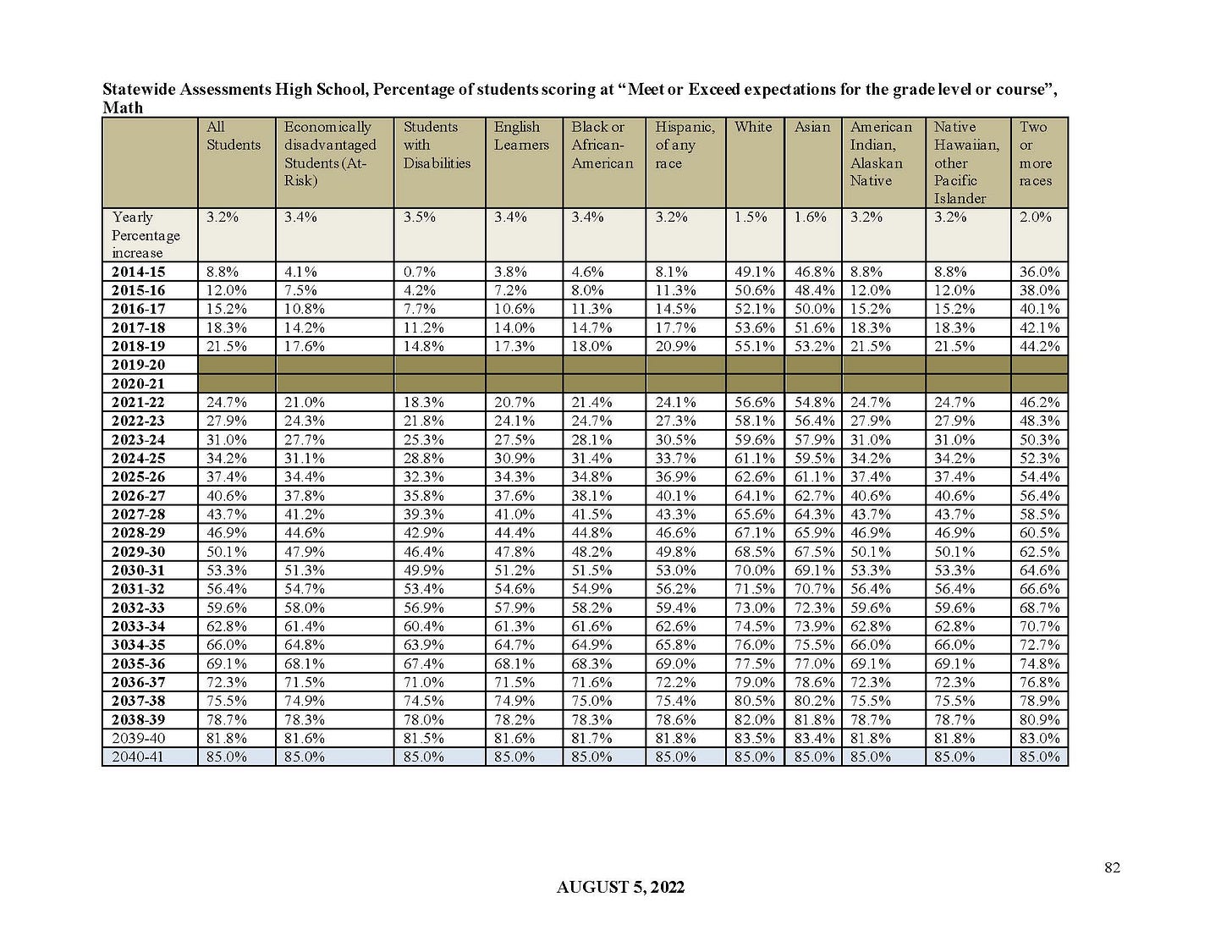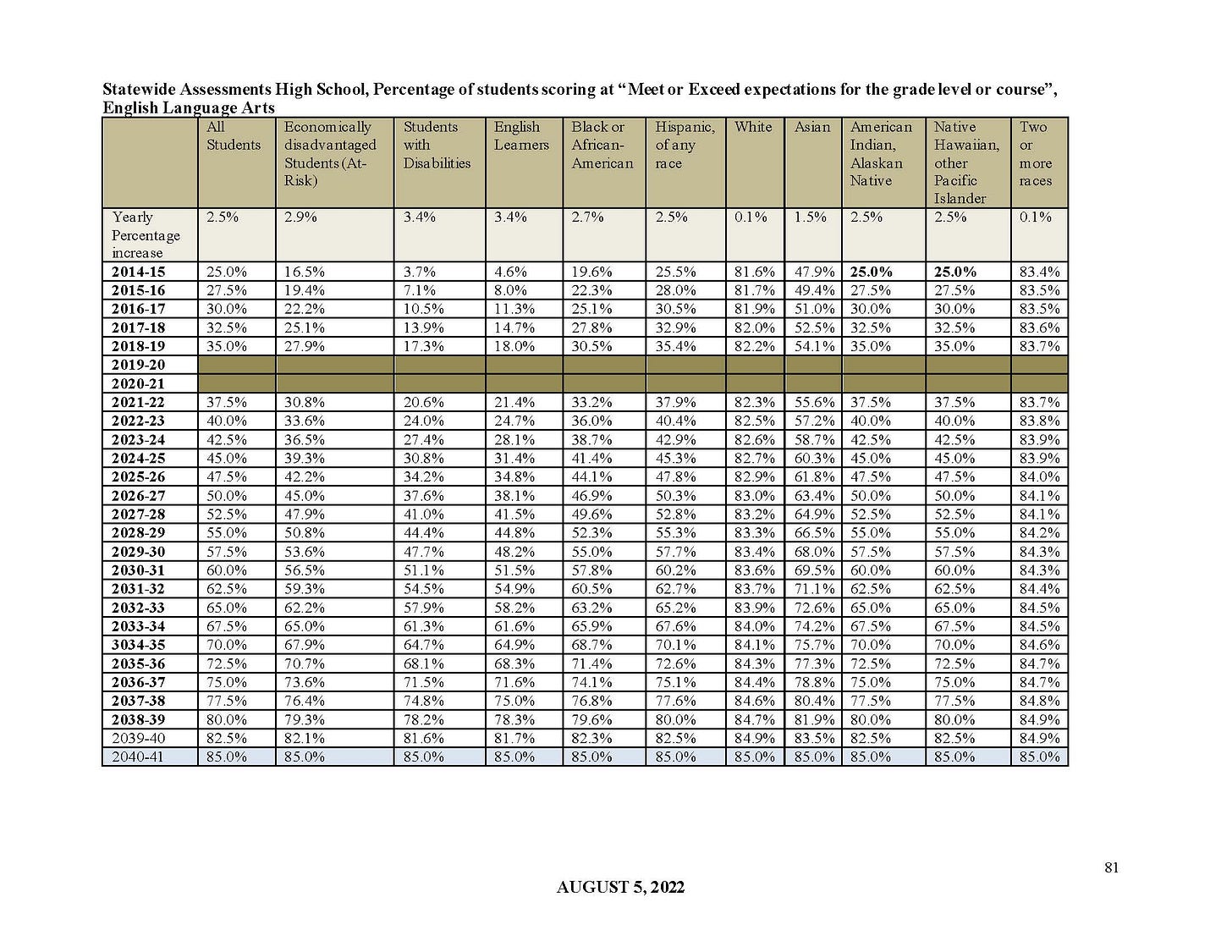D.C. government does not require schools to educate black students as well as white students
Author Jeff Schmidt explains to Biden administration why lower academic standards for black students constitute racial discrimination, files civil rights complaint
Racial discrimination against black students is official in D.C. schools. Most people think that such official discrimination ended more than half a century ago. Not so.
Let me personally introduce the author of this informative civil rights complaint.
Jeff Schmidt is a social theorist whose work I greatly admire.
He is the author of the landmark 2000 book “Disciplined Minds: A Critical Look at Salaried Professionals and the Soul-Battering System that Shapes their Lives”. That book changed my life, and I became friends with Jeff, who is also a PhD physicist and a dedicated educator.
Jeff was fired from his job as an associate editor at Physics Today for writing that book. That made me want to get the book right away. My reading was a nightmarish autopsy of exactly how I had been indoctrinated in my lengthy professional training, including my tenure path. Teachers, lawyers, doctors, scientists, police officers, nurses, judges, accountants… I recommend buying a paper copy of Jeff’s book and not letting go until you drop.
Jeff did not want me to include his picture. Here is one I found on the internet:
Jeff is a long-time DC resident and father of a student who graduated from DC public schools and then went on to graduate from college. Jeff was a civil rights activist when he was a university student. He has followed every development of the school system and its government oversight. Like most of us, he is not pleased.
Here is the complaint he filed recently, which exposes the extreme hypocrisy of the liberal elite that has engineered the state of public schools in the USA.
27 June 2023 / To: Michael Seth Gerton / Office for Civil Rights / U.S. Department of Education / 400 Maryland Avenue SW / Washington, DC 20202 / michael.gerton@ed.gov
Dear Mr. Gerton,
Thank you for following up on my complaint about racial discrimination in District of Columbia public schools.
Your request of 14 June 2023 (appended below) has four parts...
A detailed description of the discrimination.
Date(s) of discrimination.
Person(s) responsible.
Why you believe the alleged conduct or act(s) constituted discrimination.
I address them below.
Best wishes,
Jeff Schmidt
1. A detailed description of the discrimination
District of Columbia public schools have lower academic achievement goals for black students than for white students.
They plan to maintain the lower goals until the year 2041. That year is so far off that the lower academic goals apply to black children who haven’t even been born yet. A black child born today will be out of high school before D.C. schools are required to educate black children as well as white children.[1]
The unequal academic expectations will victimize two generations of students: the 96,000 children now in D.C. public schools and, over the next two decades, a comparable number of children, most of whom are yet to be born.
D.C.’s academic achievement plan, with its timetable of essentially never for racial equality, appears designed to benefit D.C. politicians and education authorities, not children. The low goals make it as easy as possible for officials to say that schools are meeting their goals. That helps hide their failure to make students proficient in English and math and allows them to avoid serious consequences for that failure.
Note that private schools in D.C. comply with civil rights laws and do not have lower academic achievement goals for their black students. Black children who cannot afford private-school tuition deserve to attend public schools that are free of racial discrimination in academic achievement goals.
Saying that schools will start practicing racial equality in academic expectations in 2041 does amount to saying never, and everyone knows that. School accountability frameworks don’t last that long. The “No Child Left Behind Act” lasted about 14 years before Congress scrapped it and replaced it with the “Every Student Succeeds Act.”
D.C.’s scheme allows schools to teach only 31 percent of today's black 8th graders to do math at grade level by the time they are tested in high school two years from now.
However, according to the plan, schools had better pay close attention to their white students, for administrators will be in trouble unless their white students are proficient at almost double that rate (61 percent). The black and white goals for English are 41 percent and 83 percent proficient, respectively.[2]
D.C.’s academic achievement plan sets low goals for Latino students, too, and so in most places here the word “black” could be replaced by “black and Latino.”
Harm
Allowing schools to have lower academic achievement goals for their minority students deprives minority children of their right to be treated and judged as individuals. A school with unequal academic goals tells a black student, in essence, “We don't expect as much from you, because many other black students have performed poorly.” How else would you explain the school’s prejudgment to a black child?
The superintendent of education, board of education and individual public schools have decided in advance that tens of thousands of black children, half of whom are yet to be born, will enter the classroom with a badge of inferiority -- their minority status. No matter how hard a minority child works, her public school will see her as being in a low-expectation group until 2041, and that will undermine her education. Countless education studies and experiments have confirmed the obvious fact that expectation affects outcome. It affects not only educators, but also students themselves. (“A sense of inferiority affects the motivation of a child to learn.” -- Brown v. Board of Education, 1954)
D.C.’s practice of racial discrimination in setting academic achievement goals allows it to practice racial discrimination in instruction. Today, most instruction in classrooms with predominately black students is below grade level. This is proven by the simple fact that black students are given passing grades (and diplomas) but badly fail externally written grade-level tests. The passing grades reflect student mastery of the material covered in class; the failure on the standardized test proves that the material covered in class was not at grade level.
If the Office of Civil Rights were to disallow D.C.’s racially discriminatory academic achievement goals, then D.C. school officials would have to make grade-level instruction available in every public-school classroom, not just in classrooms with a significant number of white students.
The harm done by the racial discrimination in academic achievement goals and by the racial discrimination in instruction is ongoing. Please note that my discrimination complaint is about each of these forms of racial discrimination.
ESSA
D.C. education authorities have misused the Every Student Succeeds Act to set ridiculously low academic achievement goals for black students, not to help black students but to minimize the chance that the authorities will face consequences for failing to educate black students. This maneuver amounts to gross racial discrimination, and the Office of Civil Rights must not condone it.
ESSA anticipates and forbids its misuse, and does so by requiring that academic achievement goals be “ambitious.”[3] It would be scandalous if the Office of Civil Rights accepted as ambitious a plan that dooms black children who have not even been born yet to go through their entire K-12 education in schools that have lower academic achievement goals for them than for their white classmates.
ESSA does not trump civil rights laws, and the Office of Civil Rights must not allow D.C. authorities to use it as a cover for racial discrimination in public schools.
Alternative to academic racial profiling
If D.C. education officials really wanted to eliminate the racial achievement gap, then they would look for an alternative to their academic racial profiling, which undermines the necessary administrator incentives, teacher expectations and student morale.
That would go a long way toward settling this complaint.
The federal Every Student Succeeds Act does not require schools to have lower academic proficiency goals for minority children than for white children. If D.C. wants to set different proficiency goals for different students, then it should do so according to each student's current proficiency, which D.C. measures every year, not automatically according to the student's race. It is arguably reasonable to have a lower end-of-year proficiency expectation for a student who begins the year with extremely low proficiency -- but not simply because the student is black.
D.C. should shift to adaptive testing to pinpoint each student’s proficiency as a grade level, such as “grade 4.6 in math” or “grade 9.2 in English.”
D.C. could then easily come up with an education plan that is free of racial prejudgment, simply by replacing grouping-by-race with grouping by actual measured proficiency. Each proficiency-level group would have its own year-end proficiency goals, which would be set to require greater growth by lower-proficiency groups. Within each proficiency group, students of all races would have exactly the same academic goals, and so there would not be racial profiling.
Achieving the proficiency-group goals would also raise the scores of racial groups by amounts that could be calculated and reported. Scores of low-performing students and racial groups would increase the most.
D.C. could set academic goals for minority students in each proficiency group -- the same as the goals for the white students in those groups. It could rate schools on how well they achieved those goals and on how equal were the gains of minority and white students within each proficiency group.
For obvious reasons, D.C. education officials wrote their odious academic racial profiling timetable in secret, without the knowledge or participation of parents. An alternative plan free of racial discrimination must be developed in full public view with public hearings and public participation.
2. Date(s) of discrimination
The discrimination is ongoing, as explained above. It is in effect every day, including 12 May 2023, the day I filed the complaint.
3. Person(s) responsible
Muriel Elizabeth Bowser, mayor of the District of Columbia, is responsible for the discriminatory practice, because D.C. has a system of mayoral control of the schools.
Christina Grant, D.C. State Superintendent of Education, is also responsible for the discriminatory practice, because the Office of the State Superintendent of Education drafted the policy and put it in place.
Eboni-Rose Thompson, president of the D.C. State Board of Education, is also responsible for the discriminatory practice, because the board approved it.
4. Why you believe the alleged conduct or act(s) constituted discrimination
Assigning a black student to a group with low academic expectations solely on the basis of the student’s race, regardless of the student’s academic performance, is racial discrimination.
And allowing most instruction in classrooms without a significant number of white students to be below grade level is also discrimination.
References
1. District of Columbia Consolidated State Plan dated 5 August 2022
2. See the plan’s high-school math and English goals, appended below.
3. ESSA (2015): “Establish ambitious State-designed long-term goals”
From: Gerton, Michael <Michael.Gerton@ed.gov> / To: jeffschmidt@alumni.uci.edu / Sent: Wed, Jun 14, 2023 2:18 pm / Subject: OCR Case Nos. 11-23-1515; 11-23-4058; and 11-23-4059
Hello Mr. Schmidt,
My name is Michael Gerton, and I’m an attorney in the Office for Civil Rights (OCR) at the U.S. Department of Education. I will be handling the complaints you filed against District of Columbia Schools (OCR Case No. 11-23-1515), the Office of the State Superintendent of Education (OCR Case No. 11-23-4058), and the District of Columbia State Board of Education (OCR Case No. 11-23-4059). On a call or in response to this email, OCR will need some additional information in order to clarify the allegations in your complaints:
1. A detailed description of the discrimination.
2. Date(s) of discrimination.
3. Person(s) responsible.
4. Why you believe the alleged conduct or act(s) constituted discrimination.
Please provide the information requested above at your earliest convenience. If we do not receive the information requested above within 20 days of this email by phone or via email, your complaints will be dismissed. Let me know if you have any questions.
Thank you,
Michael Gerton
Attorney, Office for Civil Rights / U.S. Department of Education / 400 Maryland Avenue SW / Washington, DC 20202 / (202) 245-7711 | michael.gerton@ed.gov








I saw this in Newark, NJ when I was an adjunct professor in the summer of 1990. I had been a teaching assistant for three years at Rutgers during my masters program and graduated in the spring of 1990. I taught Freshman English/Writing courses. I had a remedial section in the summer after I graduated. All of the students had graduated high school from Newark public schools. I did not give any grades higher than a C. I told them I could not grade on a curve because when they passed my course they would have to compete with the general student population in English 101 (Introduction to Writing). I told them if I graded on a curve, they would be devastated to see their grades when competing with the other students in English 101 and would not likely pass. I told one student, who improved from about Third Grade level writing to Ninth Grade level writing over the summer that she needed to take the Remedial Course again and keep working on improvement, in order to be able to compete with the rest of her Freshman Class peers. It was really hard to have to do this but I felt it would have been misleading to grade these summer students against themselves then throw them to the wolves with the rest of the Freshman Class in their next section.
I think of this a lot as an attorney who works in public interest law representing parents in juvenile dependency (CPS) cases. We do no service to people when we lower our expectations for them based on external criteria. We must believe in people, share our beliefs that they can accomplish what they set their minds to, and give them the resources to succeed. People rise to meet expectations when people believe in them and inculcate in them the same belief that they have the ability to succeed. We must give them the resources to succeed or our efforts will fail. I remember telling my high school 11th Grade English professor that “My worst was my best for her.” Sadly, she DGAS and just went through the motions of teaching, in my case, the daughter of a university professor, I knew what I could achieve, but like any teenager, I needed to be prodded because most teenagers are lazy and not self motivated.
Imagine if we had teachers, all over the country from Kindergarten on up, that believed in their students and gave them the resources to succeed. Did not accept any outside excuses, like race, family origin or style, neighborhood, ethnicity, and so on. Had IEPs for those with learning and cognitive issues. We need to get rid of institutionalized education. No more teacher unions. Let teachers teach without the heavy hand of politics, metrics, and federal funding.
Jeff Schmidt sent me this comment, and I have permission to share it:
"It's great to see that people have commented on the complaint.
The liberal establishment won't talk about this stuff. When they are confronted with the failure of their schools, they say "we have to do better." They are happy to spend more money, much of which is wasted on high salaries and graft, but they refuse to hold anyone accountable for the educational outcome. They may be buying people's silence with the high salaries."